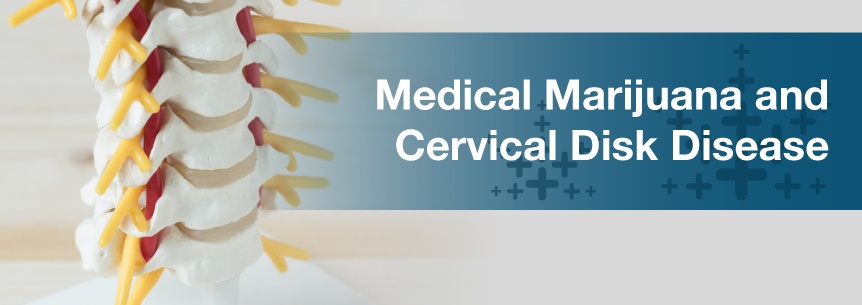
Numerous states are legalizing cannabis for medical use for a variety of qualifying conditions recently, and there’s increasing interest in trying the herb out for back and neck pain. The second most abundant research is now showing that cannabidiol, or CBD, is a potent ingredient in treating cervical disk disease.
Research reveals the potential of CBD for treating certain conditions. And people are beginning to recognize CBD as a therapeutic cannabinoid. Cervical disk disease treatment with CBD is showing significant promise.
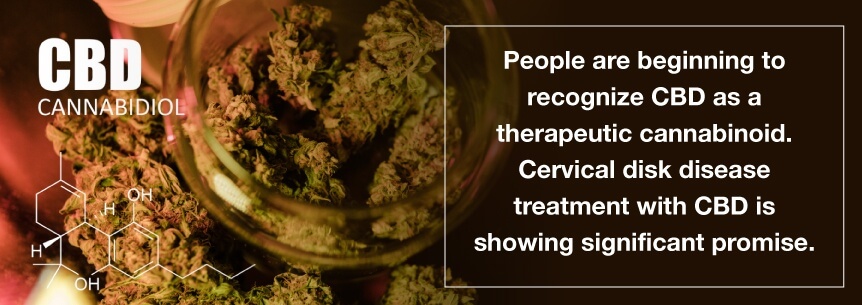
Many people already accept CBD as an anti-inflammatory, and it’s being recognized as a meaningful component in mental health care. For instance, PLoS One conducted a 2014 study concluding cannabidiol’s protective effects on lesion-induced degenerative disk disorder.
The researchers studied 19 rat subjects where they create injuries in the rats’ tailbones using needles to mimic DDD in humans. They separated the rats into three groups and gave them different CBD concentrations: 30 nmol, 60 nmol and 120 nmol. They then examined the rats through MRI and microscope to see CBD’s effects accurately.
The study showed the rat subjects given 120 nmol of CBD displayed reduced lesion damage. The effects continued throughout the entire 15 days of evaluation.
Find A Doctor Find A Dispensary
Cervical disk degeneration is a common cause of neck pain, most frequently felt as a stiff neck. This condition is far more common than disk degeneration in the lumbar spine, mainly because the neck is generally subjected to far less torque and force. A fall or twisting injury to the disk space in the spine may cause degeneration and accumulated wear and tear on the disk over time. In addition to having low-grade symptoms such as a stiff neck or inflexible neck, many patients who suffer from cervical disc disease have feelings of weakness, tingling and numbness in the arms, neck and shoulders.
Medical marijuana is an exceptional treatment option to help those who suffer from symptoms of this chronic disease. By alleviating most forms of pain associated with a stiff or inflexible neck, serving as a muscle relaxer so you can turn your head and bringing sensation to the limbs, this is a great medicinal option if you are concerned about prescription opiates. Medical marijuana has been directly associated with being able to reduce the symptoms that are associated with this terrible disease.
Let’s look further into medical marijuana for cervical disk disease at alleviating specific symptoms:
Using marijuana as a cervical disk disease treatment to relieve the discomfort of disk disease is growing, and the medicinal properties of the herb are becoming more widely accepted. Besides medical weed’s preventative properties, marijuana’s anti-inflammatory and pain-relieving properties are also proving useful in the management of the condition’s symptoms.
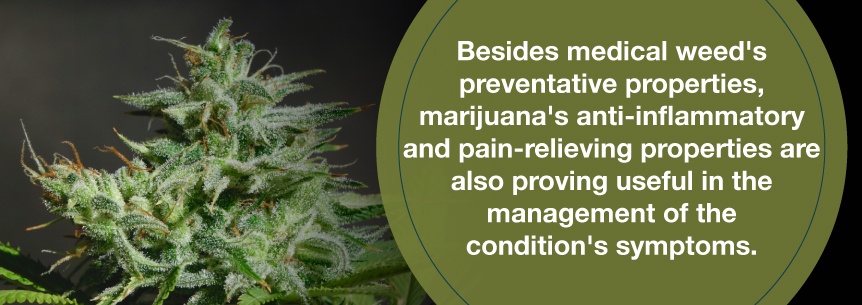
Some good medical cannabis for cervical disk disease strains to try include:
Chronic pain is a hard ailment to manage and is extremely uncomfortable. Aside from this, it’s also a huge reason why many individuals are reaching out to cannabis for help. Some good strains to choose from include:
Individuals seeking anti-inflammatory, anti-pain and anti-spasm effects are looking for strains rich in CBD. The cannabis strains below work well for inflammation and other symptoms like pain, depression, anxiety, spasms and more.
Although more and more people are starting to use cannabis medicinally, a challenge potential users often face is determining the proper consumption method. You can divide medical pot consumption methods into three broad categories: inhalation, oral or ingestible techniques and topical.
Inhalation
Ingestible
Topical
You have a handful of ways to fulfill your medical marijuana needs. You now need to begin experimenting on your own and with the help of an experienced budtender to decide which method works best for you.
Here, we’ve provided you with background information using marijuana for cervical disk disease. Professional and trained cannabis doctors can guide you on how you to properly medicate with cannabis. You can also turn to your dispensary staff to help with your product selection.
You can find a comprehensive list of both qualified cannabis doctors and dispensaries here at MarijuanaDoctors.com. The strains we presented above are a good starting point to begin treating your cervical disk disease symptoms. But a trained medical cannabis doctor will provide you with the required recommendation you need and guide you in choosing the most suitable strains for you to deliver optimal symptom-relief results.
Find A Doctor Find A Dispensary
Cervical disk disease, sometimes spelled cervical disc disease, is a form of degenerative disc disease (DDD). If you have degenerative disc disease, you have a disorder where one or more disks in your spine loses their strength. Despite the name, DDD isn’t a disease, technically, but rather a progressive condition that occurs from wear and tear over time or from injury.
Cervical disk disease occurs when one or more of the cushioned disks in your cervical spine, or the neck portion of your spine, breaks down due to wear and tear. It’s a degenerative process causing radiating pain, weakness and numbness in your arms, shoulders and hand. The loss of mobility and discomfort you experience from this condition can majorly impact your quality of life.
Your cervical and back disks sit in between your spine’s vertebrae. They act as shock absorbers and cushions, helping you stand up straight. Decades of lifting, bending, twisting and turning can do a number on your back and neck. And, because of this repetitive stress, around two-thirds of individuals will end up experiencing neck pain some time in their lives.
Over time, cervical degenerative disk disease can become worse, causing mild to intense pain that could impact your daily activities and quality of life.
The leading cause of degenerative disc disease is spinal disk wear and tear. Over time, your disks can dry out naturally, losing their ability to function and support. This results in pain and other DDD symptoms. Degenerative disc disease may begin developing when you’re in your 30s and 40s and then worsen progressively. Once you have a damaged disk, it doesn’t repair itself.
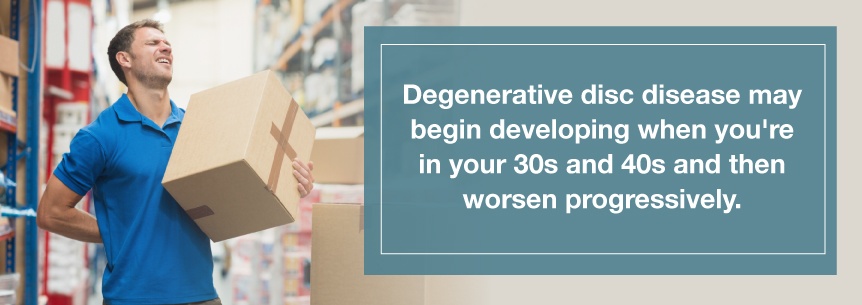
While almost everybody will eventually get cervical disk disease as they get older, certain risk factors can increase their risk of developing the condition sooner or causing it to become symptomatic. The risk factors are:
There are several types of cervical disk disease, which are:
Cervical disk disease symptoms can vary among people widely. When the condition turns symptomatic, the pain may appear suddenly or develop gradually over time. Your symptoms can be anything from mild discomfort to debilitating pain, weakness or numbness that radiates into your hand and arm.
Some common traits of the condition include:
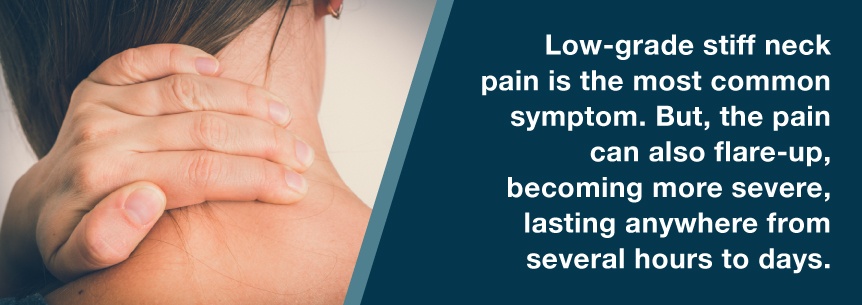
If your pain is due to the degenerative disk alone, it will likely dissipate within a few weeks or months by itself. But, other cervical degenerative disk disease symptoms tend to become chronic, requiring treatment if facet neck joints — the joints connecting vertebrae — begin degenerating or you have a pinched spinal nerve.
Degenerative disc disease rarely leads to more severe disorders. However, if you experience any of the following, you need to seek medical care immediately:
When you have cervical disk disease, not only can it cause your chronic pain, but it can also lead to anxiety and depression.
Research supports the role of psychological and social variables affecting spinal surgery results. Studies within this research show depression symptoms before surgery were present in 11.7 percent of cervical disk disease patients. Around seven percent of patients experienced depression at first post-operative evaluation, and 7.5 percent of patients six months after surgery. The research shows a higher depression incidence rate both before and after surgery in those patients who were unemployed.
Statistics reported by BMJ Publishing Group show:
Other statistics reported by Rheumatology Advisor reveal:
For cervical degenerative disk disease-related neck pain, a physician usually suggests one or several of the treatment options below:
They may also consider other options like electrical stimulation, massage therapy, acupuncture or bracing.
When the above conservative treatments fail to remedy your pain, physicians consider surgery to treat the condition in a couple of scenarios:
Degenerative disc disease is a prevalent disorder afflicting populations globally. The decreased quality of life and economic impact mainly stem from neurological deficits and back pain linked with intervertebral disk degeneration. Even though researchers have invested a great deal of effort into understanding DDD’s etiology and its association with back pain onset, it’s still a work in progress.
A couple of methods for treating the condition are preventative and therapeutic.
There’s still debate over what the ideal treatment option is for discogenic back pain.